|
|
|
Sort Order |
|
|
|
Items / Page
|
|
|
|
|
|
|
| Srl | Item |
| 1 |
ID:
078533
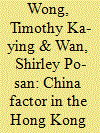

|
|
|
|
|
| Publication |
2007.
|
| Summary/Abstract |
This article depicts changes in the public's perceptions in Hong Kong of the implementation of the "one country, two systems" policy following the handover in 1997 and discusses the role of the China factor in shaping such perceptions. It finds that the Hong Kong people's rating of "one country, two systems" was quite positive in the first two years after the handover, but the rating started to fall after April 1999 and reached its record low in April 2004. Although the rating has since risen somewhat, the Hong Kong public has not regained all the confidence it previously had in the policy. Beijing's Hong Kong policy is the most powerful variable shaping the public's perceptions of the "one country, two systems" policy, followed by trust in the Hong Kong government, the government's performance in mainland-Hong Kong relations, and the government's political performance. Since all four variables are largely politically related, it seems that the public's perceptions of "one country, two systems" have largely been shaped by political affairs related to maintaining Hong Kong as a highly autonomous system in the "one country, two systems" plan.
|
|
|
|
|
|
|
|
|
|
|
|
|
|
|
|
| 2 |
ID:
099602
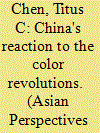

|
|
|
| 3 |
ID:
118417
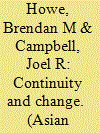

|
|
|
|
|
| Publication |
2013.
|
| Summary/Abstract |
In this article, we address four common, often contradictory misconceptions concerning Japanese foreign and security policy. First, Japan's strategic "normalization" is dangerous. Second, Japan is incapable of having a "normal" policy. Third, Japan is about to become "normal." Fourth, foreign and security policy under the Democratic Party of Japan (DPJ) will differ radically from what it was for fifty years under the Liberal Democratic Party (LDP). We contend that Japan is not a threat; that it has a security policy, but not one that fits well with Western models; and that Japan's security policy is changing, gradually not radically, and is not becoming just like the West's.
|
|
|
|
|
|
|
|
|
|
|
|
|
|
|
|
| 4 |
ID:
092260


|
|
|
|
|
| Publication |
2009.
|
| Summary/Abstract |
Much has been written on the triangular, and increasingly high-profile, China-Taiwan-US relations. However, scholars have yet to apply Diversionary Theory to the China-Taiwan dyad. DT argues that leaders may resort to international conflict when domestic political and economic situations become troublesome, aiming at directing public attention away from problems at home. While creation of explicit military conflict in the Taiwan Strait by Taipei is deemed quite unlikely, more subtle processes of diversion might be expected instead. This article applies a variant on DT to assess whether leaders in Taipei have used rhetoric about Taiwan independence or unification as a distraction from domestic problems during the years leading up to Taiwan's 2004 presidential election. We find that, as the president's approval sinks, pro-independence rhetoric becomes more likely. Overall, the results of this study confirm extension of DT to the case of Taiwan and encourage further research applied to middle powers.
|
|
|
|
|
|
|
|
|
|
|
|
|
|
|
|
| 5 |
ID:
156253
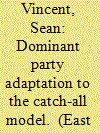

|
|
|
|
|
| Summary/Abstract |
In the process of democratisation, it is expected that a former dominant party, at least one which abides by the rules of electoral contestation, will transition into a “catch-all” party. A catch-all party aims to attract the votes of all social cleavages and classes of voters outside what would be considered their traditional voter base. As part of the wider debate about democratisation in East Asia, this paper examines how two of East Asia’s liberal democracies—Japan and South Korea, the LDP and GNP/Saenuri, respectively, have adapted to electoral defeat and in what ways they have transitioned into catch-all parties in the Kircheimer mould. This paper finds that while intra-party reforms which could fit a catch-all model have yet to be institutionalised, data from the Comparative Manifesto Database shows that there has been a significant change in which policies both parties promote and that these are designed to appeal to a broad base of voters.
|
|
|
|
|
|
|
|
|
|
|
|
|
|
|
|
| 6 |
ID:
112218
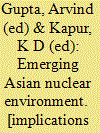

|
|
|
|
|
| Publication |
New Delhi, Lancer's Books, 2012.
|
| Description |
xv, 432p.
|
| Series |
Indian Pugwah Society
|
| Standard Number |
8170951240
|
|
|
|
|
|
|
|
|
|
|
|
Copies: C:2/I:0,R:0,Q:0
Circulation
| Accession# | Call# | Current Location | Status | Policy | Location |
| 056414 | 327.7305/GUP 056414 | Main | On Shelf | General | |
| 056415 | 327.7305/GUP 056415 | Main | On Shelf | General | |
|
|
|
|
| 7 |
ID:
099607
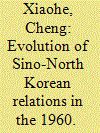

|
|
|
|
|
| Publication |
2010.
|
| Summary/Abstract |
The evolution of Sino-North Korean relations is an interesting historical phenomenon worth careful reexamination. The diplomatic documents recently declassified by the Chinese government shed new light on this old issue. Based on previous research and new information, the author finds that Sino-North Korean relations were closely related to Soviet-North Korean relations: The two sets of bilateral relations ran in opposite directions. Moreover, the rise and fall of North Korea's relations with China were determined by the political division on the Korean peninsula and Sino-Soviet polemics, and in the competition for influence between ideological and security concerns, the latter won out. Throughout, North Korea was not weak; it was in control of its relations with its two major allies.
|
|
|
|
|
|
|
|
|
|
|
|
|
|
|
|
| 8 |
ID:
082253
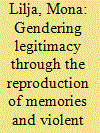

|
|
|
|
|
| Publication |
2008.
|
| Summary/Abstract |
This article argues that the legitimacy of both male and female politicians in Cambodia is partly built on discourses of violence and reconstructed memories of the past. From this standpoint, this article looks at how women's and men's relation to violence-and memories of violence-creates and undermines their legitimacy as political leaders. Additionally, it relates how women use memories of violence in their strategies to increase their political authority. Based on interviews with fifty-two female and male politicians and nongovernmental workers in Cambodia, this article addresses how discourses on politics rely on notions of "then" and "now" of violence and the images of identity emerging from these
|
|
|
|
|
|
|
|
|
|
|
|
|
|
|
|
| 9 |
ID:
083788
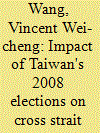

|
|
|
|
|
| Publication |
2008.
|
| Summary/Abstract |
As an "index case" of Third-Wave democracies facing existential threat, Taiwan's elections entail important implications for study in comparative politics and international relations. In 2008, three important elections help define the course of Taiwan's democratic development and its relationship with China: the January legislative election, the March presidential election, and a controversial referendum on Taiwan's United Nations entry. This article employs game theory to analyze the impact of Taiwan's 2008 elections on cross-strait relations. It develops an "election game" by examining each principal player's preferences regarding each election. It analyzes Beijing's possible reaction to the potential outcomes, and then examines the actual election outcomes against the model and offers observations on the prospect of cross-strait relations. Overall, the model predicts that cross-strait relations after the 2008 elections will present a historic opportunity, which can be seized or squandered, depending on political leadership
|
|
|
|
|
|
|
|
|
|
|
|
|
|
|
|
| 10 |
ID:
096031
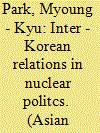

|
|
|
|
|
| Publication |
2010.
|
| Summary/Abstract |
This article aims at explaining the changes in inter-Korean relations since inauguration of the new administration in South Korea in 2008. By focusing on leadership, regime, and social factors in the two Koreas, the article emphasizes the social dynamics that are shaping inter-Korean relations despite the nuclear dispute. In the political realm, a tough stance toward North Korea's nuclear ambition by the South's government has created a sense of frustration within the North Korean leadership, causing tension and conflict with the South. In the social realm, however, both Koreas have been pressured by political and economic hardship and a growing sense of crisis among their citizens. From that latter perspective, however, the prospects are that the two Koreas will move toward more cooperative behavior. The role of nongovernmental organizations (NGOs) and the United States will be important in achieving that outcome.
|
|
|
|
|
|
|
|
|
|
|
|
|
|
|
|
| 11 |
ID:
085292
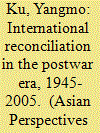

|
|
|
|
|
| Publication |
2008.
|
| Summary/Abstract |
Under what conditions do sets of two former adversary states with deeply rooted historical animosity try to reconcile with each other? When they seek bilateral reconciliation, why are the outcomes significantly different? France and Germany were historic antagonists that fought three catastrophic wars between 1870 and 1945. In the postwar era, however, their antagonism and hostility dramatically evolved into mutual partnership and cooperation. Unlike the Franco-German case, Japan-Republic of Korea relations still remain frigid due to mistrust and enmity, although sixty-three years have passed since Korea's liberation from Japanese colonial rule. This article argues that in both cases, the motives for reconciliation were mainly derived from realpolitik concerns such as security and economy. Structural conditions also affected the initiation of international reconciliation. Nonetheless, it was the dynamics of political leaders and nongovernmental organizations that played central roles in differentiating the reconciliation processes and outcomes in the two dyadic relationships.
|
|
|
|
|
|
|
|
|
|
|
|
|
|
|
|
| 12 |
ID:
096032
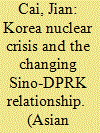

|
|
|
|
|
| Publication |
2010.
|
| Summary/Abstract |
When the DPRK conducted its first nuclear test on October 9, 2006, the second Korea nuclear crisis reached a climax, but almost everybody still believed in that North Korea was just playing a political card. After it conducted a second nuclear test on May 25, 2009, most people changed their thoughts and concluded that the Six Party Talks which aimed to solve the crisis are a total failure. This article analyzes the reasons and purposes for the DPRK's nuclear tests, considers the origin and development of the Six Party Talks, and concludes that the talks, while frustrating to various parties, have not been a total failure since they were moving in the right direction. The article examines the changing Sino-DPRK relationship and concludes that China should develop a long-term strategy toward the Korean peninsula and change its diplomatic policy toward the DPRK.
|
|
|
|
|
|
|
|
|
|
|
|
|
|
|
|
| 13 |
ID:
083786
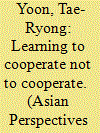

|
|
|
|
|
| Publication |
2008.
|
| Summary/Abstract |
With the conceptual tool of "Pareto optimum" (or "Pareto frontier"), this article offers an explanation as to why the 1965 Korea-Japan normalization was achieved at that particular time. No existing single factor can sufficiently explain the outcome. The exclusive focus of the existing literature on favorable domestic and international conditions only after General Park Chung-hee's military coup in 1961 blinds us to the long-term learning process of the two states. We also need to ask a non-question: Why was normalization so delayed even under favorable conditions at the time? Based on counterfactual analysis, this article argues that without the coup, normalization would have been achieved much faster and in a way more conducive to the genuine Korea-Japan reconciliation. The complicated political situation caused by Park's military coup delayed rather than accelerated the normalization. Refocused analysis suggests that an America-centric approach turns our attention away from the simple but crucial fact that Korea and Japan themselves were most responsible for determining their own bilateral relations, and that the U.S. role in Korea-Japan relations was significant but not determining.
|
|
|
|
|
|
|
|
|
|
|
|
|
|
|
|
| 14 |
ID:
096029
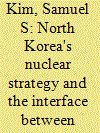

|
|
|
| 15 |
ID:
099603


|
|
|
|
|
| Publication |
2010.
|
| Summary/Abstract |
This article examines party institutionalization in Hong Kong in order to understand the development of political parties in a political system undergoing democratization. Party institutionalization is defined as the extent to which political parties develop a systematic set of mechanisms and structures that enable them to compete effectively for political power. By examining partisanship, autonomy, and the stability of political parties in Hong Kong, the author concludes that party institutionalization is still weak, although there are signs of progress. Constitutional constraints, structural factors, lack of public support, and the problem of adaptation pose serious obstacles in the party institutionalization process. Political parties, as one of the essential conditions for democratic consolidation, have brought a new page of democratic politics to Hong Kong. However, in terms of institutionalization, political parties in Hong Kong are far from mature, thereby limiting their impact on the democratization process.
|
|
|
|
|
|
|
|
|
|
|
|
|
|
|
|
| 16 |
ID:
085303
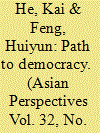

|
|
|
|
|
| Publication |
2008.
|
| Summary/Abstract |
China's transition is drawing worldwide attention. China started market economic reforms in 1978 and is rapidly closing its economic gap with the developed world. The Chinese public and Chinese leaders have started to debate and explore where China should go politically and how to get there. After examining the merits and weaknesses of four prevailing theories of democratization-modernization, social mobilization, cultural/social capital, and negotiation-pact transition theory-we conclude with an appropriate model for China's political future. We argue that (1) the conflict between the reform and conservative groups inside the communist regime will shape the process of China's democratization; (2) the hope of China's political future lies in continued economic development, a mature civil society, and the building of democratic political culture in society; and (3) the current intra-party democracy promoted by Hu and Wen signals a positive trend for China's future democratization.
|
|
|
|
|
|
|
|
|
|
|
|
|
|
|
|
| 17 |
ID:
085293
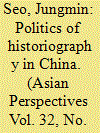

|
|
|
|
|
| Publication |
2008.
|
| Summary/Abstract |
This article contextualizes the emergence of the Chinese claim over the historical ownership of Koguryo in the politics of historiography in China. Contemporary Chinese historiography from which the Chinese state and populace draw core identities has never been fully fixed or stabilized. Regardless of the temporal distance from the present, Chinese pasts are continuously constructed and re-memorized based on contemporary sociopolitical needs. Compared to the pre-reform eras, broadened social spaces in China have made the Chinese Communist Party's monopoly over historiography untenable. In that sense, the future of East Asian regional order or Sino-Korean relations is highly unpredictable, if not unstable, due to the continuously changing Chinese national identity. With radical nationalization of China's imperial past, the next generation in China may favor actions to alter the status quo. National and state identities informed by "historical facts" are hardly negotiable or changeable.
|
|
|
|
|
|
|
|
|
|
|
|
|
|
|
|
| 18 |
ID:
109791
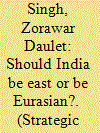

|
|
|
| 19 |
ID:
085295
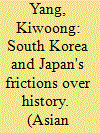

|
|
|
|
|
| Publication |
2008.
|
| Summary/Abstract |
This article looks at the characteristics of "frictions over history" in ROK-Japan relations since the 1990s, with a focus on Korea's responses. It addresses some hypotheses on the characteristics and trends shown in the political process of "blundering" through comparative analysis of sixty-one cases, and additionally presents an in-depth case study on Prime Minister Abe Shinzo's remarks of 2007 concerning the comfort women issue. This research shows that the responses to blunders and the political process were the products of interactions between the agent's speech acts and are a type of language game that is linguistically inter-constituted. Moreover, the 2007 comfort women case study shows that conflicts and the process of negotiations regarding blunders are a type of constructive language game in which the agents construct rules of engagement, modify mutual perceptions, and transform actors themselves through a series of speech acts.
|
|
|
|
|
|
|
|
|
|
|
|
|
|
|
|
| 20 |
ID:
085297
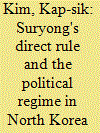

|
|
|
|
|
| Publication |
2008.
|
| Summary/Abstract |
The political system in North Korea has been characterized as a "Suryong Dominant Party-State System." Since the mid-1980s, however, its political system has displayed two interesting aspects. Formally, the broad "Suryong System" has been maintained; in practice, however, the Workers' Party of Korea, the Korean People's Army, and the government have come to acquire respectively different and considerably strengthened roles. Under this new regime, Kim Jong Il Suryong directly rules over the party, the government, and the military. Meanwhile, the political-ideological base, the military base, and the economic base are administered respectively by the party, the army, and the government. Interestingly, while the power of the party still overwhelms that of the military and the government, the party's means of influence has changed from giving direct orders to providing provisions or encouraging policy outlines
|
|
|
|
|
|
|
|
|
|
|
|
|
|
|
|
|
|
|
|
|